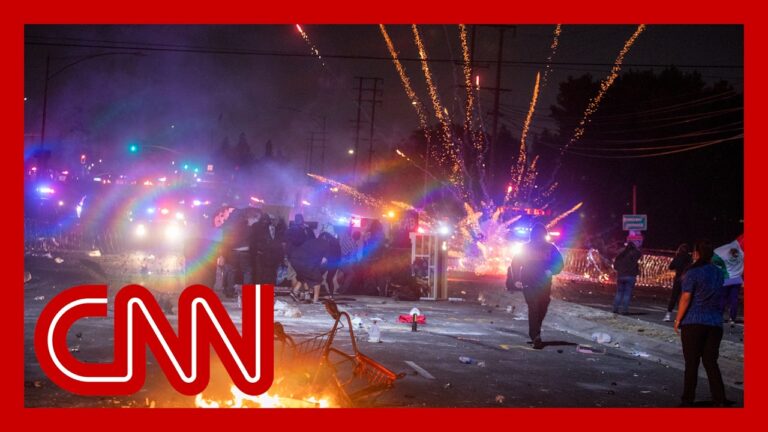Video at the bottom!
A protest against immigration raids has escalated in both Los Angeles and San Francisco, leading to multiple arrests and significant unrest. The situation began when demonstrators clashed with law enforcement, resulting in cars being set on fire and the use of flashbangs and tear gas to disperse crowds. This marks the fourth day of protests, with parts of a major freeway closed and downtown Los Angeles declared an unlawful assembly area.
In response to the unrest, President Trump has called up the National Guard, a controversial move as it’s the first time a president has taken such action without a state’s request or consent in about six years. On the ground, police report that at least 27 people were arrested during clashes on the freeway, where protesters damaged police vehicles.
The backdrop features a sharp disagreement between Trump and California Governor Gavin Newsom, who claims the federal response is exacerbating tensions. Trump has urged local authorities to take stronger action, insisting that the deployment of federal troops will restore order.
CNN senior national security analyst Juliette Kayyem discussed the historical context, highlighting that typically, federalizing the National Guard comes at the governor’s request during crises. She expressed concern over the potential for chaos and confusion when federal forces operate without local coordination.
The protests largely consist of residents, particularly from Latino communities, voicing their fears over aggressive immigration enforcement. There is a stark division in perspectives on federal immigration policy, with some arguing that California’s sanctuary laws are contributing to the unrest while others see the government’s tactics as heavy-handed.
With the prospect of police and military presence in urban areas, the conversation shifts to the implications of using active duty troops in domestic situations—raising alarms about the militarization of law enforcement and the potential suppression of dissent. The atmosphere remains charged as both sides prepare for what could be a prolonged showdown over immigration policy and civil rights.


